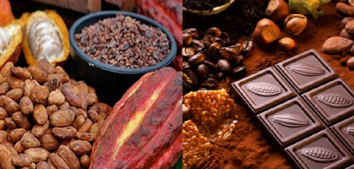
8 Habits Your Gut Will Thank You For
The number of participants during yesterday’s LIVE (almost 4,500 people!) and 4,000 comments are the best proof that the topic of healthy gut is important and necessary. After all, it is an organ that we call the second brain! Apparently 45% of Poles do not believe in the effectiveness of probiotic therapy nor do they know about it. These statistics need to change. Dr Patrycja Szachta has prepared a summary of yesterday’s meeting for you 🙂
Remember that the digestive tract is not only about digestion and absorption. Taking care of your intestines will bring you measurable health effects, seemingly unrelated to nutrition.
We can find more and more information about the fact that the intestines are the second brain and, depending on the condition of the digestive tract, our mood, reaction to stress and the ability to mentally regenerate are shaped to a large extent. The digestive tract also largely houses the immune system, i.e. the factor on which our immunity depends. Good work of the immune system is not only the efficient fight against bacterial, viral or fungal infections, but also a lower likelihood of allergic or autoimmune reactions (especially in people genetically predisposed to this type of problem). There is also a significant connection between the digestive tract and the condition of our skin. This is important especially for people struggling with the problem of atopic dermatitis, acne or psoriasis, but not only. The condition of the digestive tract is also important for people who care about a beautiful and healthy appearance.
Of course, these are not all the benefits that we can get from a healthy digestive tract. The most important factor that affects these issues is our bacterial superorganism, known as the microbiota, or the intestinal ecosystem. We have about 2 kilograms of bacteria in our intestines that affect the immune system, regulate the gut and brain axis, affect the condition of the skin and the ability to use nutrients from the diet.
Every day, intestinal microorganisms produce a number of nutrients that are able to regenerate the intestinal epithelium and favorably regulate intestinal peristalsis. The importance of a healthy microbiome in the pathogenesis of neurodegenerative and autoimmune diseases, overweight and obesity, and a number of other civilization diseases is raised more and more often.
Taking care of the proper system of microorganisms in the intestine can therefore be an important factor in the prevention and treatment of numerous ailments. For this reason, it should be a priority for every person who wants to take care of their health in a mindful way.
These are the basic principles of caring for a healthy digestive tract and microbiota.
1. DIET
Even the best supplementation will not replace the role of a healthy, balanced, and varied diet. Our gut microbiome is made up of millions of bacteria that, like us, have very different nutritional requirements. The most necessary ones for our body consume mainly dietary fiber so we must remember about its proper supply in our daily diet. It probably won’t surprise you that a poor quality diet based on highly processed products, fast food and other nutritional sins will not help in supporting a healthy intestine and good microbiota.
2. DIAGNOSTICS
If the condition of your digestive tract is not good, you suffer from digestive problems, diarrhea, flatulence, constipation or stomach pains, do not ignore it! Any deviation from the norm of health should be consulted with a specialist doctor. Do not be afraid of medical examinations – doctors do not bite. Also, remember that seemingly harmless ailments (such as chronic abdominal pain, flatulence, reflux, etc.) may be the first symptom of serious changes. What’s more, you shouldn’t try to cure these symptoms with magic supplements or diets in the hope that they will pass. We should first diagnose what’s wrong, then proceed to targeted supplementation and a diet tailored to our needs and health condition.
3. SUPPLEMENTATION
If we already know what the problem is, proper dietary management and tailored supplementation can be a valuable tool to improve health! For example, if we have a problem with microbiota disorders (e.g. after antibiotic therapy or disease), it is worth trying high-quality probiotics (live strains of bacteria with proven beneficial effect on health), or prebiotics (a nutrient for good bacteria in the intestine). If we combine this with a healthy diet, our microbiome will balance quickly!
4. WHAT IS A GOOD PROBIOTIC?
If we decide to support our intestinal bacteria, we should remember that not all probiotics are the same. First of all, we should choose products that have been properly tested in scientific research, have an appropriate number of probiotic bacteria and are properly described (the so-called bacterial passport). Therefore, it is not enough that a given bacterial strain is described in two ways, e.g. Lactobacillus rhamnosus. The most important is the number of the collection of bacterial cultures, e.g. Bifidobacterium bifidum Bb12, Lactobacillus acidophilus La 5, etc. You can type these numbers into online databases, find the preparation you are interested in and better adjust the supplementation to your health needs.
5. PROBIOTIC FOR YOU
Remember that there are no universal supplements that are good for everyone – the same rule applies to probiotics. For example, there are strains that have a positive effect on the acceleration of intestinal transit – these will be indicated for people struggling with the problem of constipation. In turn, strains with documented activity in slowing down intestinal transit will be more appropriate in diarrhea problems. There are also probiotic strains that have a positive effect on the immune system, help improve the condition of the skin in people with atopic dermatitis, or are intended for people who are very active. If we want to derive tangible benefits from this kind of supplementation, we should either make sure that we choose the right type or entrust ourselves to specialists who deal with microbiota and have professional knowledge in the field of probiotic therapy.
6. LIFESTYLE
Even the best supplements and diet will not help if we don’t take proper care of ourselves. Remember that exercise is healthy (but not too much as this unfortunately has a negative effect on the intestines which then require additional supplementation). Our digestive tract and microbiome will certainly appreciate a simple, but very important activity – proper hydration of the body! So let’s remember about the proper amount of fluids a day, not only in the form of coffee or tea. The amount and quality of sleep is also extremely important so make sure that you have a good night’s sleep.
7. STRESS – THE MAIN ENEMY OF THE MICROBIOME!
It seems that you take care of your health on a regular basis. Do you have a balanced diet, adjusted supplementation and like physical activity? So why the word “seem”? Well, the basis of health – not only in terms of intestines – is taking care to minimize the negative effects of stress! Chronic stress negatively affects the intestinal bacteria, which, in the state of equilibrium, are an important element of the gut-brain axis. Thus the paradox: on the one hand, a healthy microbiome is an ally in the fight for a good mood and mental well-being, on the other hand, everyday stress damages our intestinal ecosystem … So what should we do? Nowadays, it is difficult to avoid stress (a truism, but how real), but we can take steps to reduce its negative consequences! You had a stressful day? Then let’s get rid of it. For some people, relaxation is a good method, for others it is sport or listening to music out loud. Find your own way to deal with stress and use it in your daily practice.
8. LET’S DEBUNK THE MYTH – LACTO-FERMENTED PRODUCTS ARE NOT PROBIOTICS!
Do you take care of your intestines every day by consuming yogurt or sauerkraut? Great, because lacto-fermented products are an essential part of a healthy, balanced diet and contain many ingredients that are beneficial for health (as long as you do not have allergies or intolerances that will cause negative reactions after their consumption, of course). However – they are not probiotics!
Probiotic strains come from the human gastrointestinal tract, have been specially prepared to reach the headquarters of the microbiome in the right amount, i.e. the large intestine, and tested for their beneficial effects on our health.
You can see for yourself that the bacteria contained in yoghurt or fermented products don’t meet these criteria and should not be treated as probiotic supplementation.









Comments No Comments
Join the discussion…